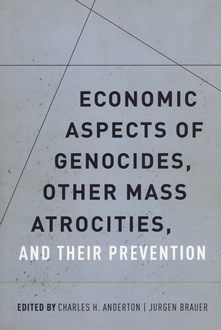Economic aspects of genocides, other mass atrocities, and their prevention / edited by Charles H. Anderton, Jurgen Brauer.
Yer Numarası
A.IX/3875
ISBN
9780199378296 (alk. paper)
9780199378302
9780190606992
9780199378302
9780190606992
Dil Kodu
İngilizce
Kütüphane
Türk Tarih Kurumu Kütüphanesi
Yayın Bilgisi
New York, NY : Oxford University Press, 2016.
Fiziksel Niteleme
xvi, 709 sayfa şekil, harita, grafik, tablo ; 24 cm
Genel Not
İndeks s. 675-709.
İçindekiler Notu
PART I. ECONOMICS AND MASS ATROCITIES: OVERVIEW -- Chapter 1. On the economics of genocides, other mass atrocities, and their prevention / Charles H. Anderton, Jurgen Brauer -- Chapter 2. “A Crime Without A Name “: defining genocide and mass atrocity / James E. Waller -- Chapter 3. Datasets and trends of genocides, mass killings, and other civilian atrocities / Charles H. Anderton -- Chapter 4. The demography of genocide / Tadeusz Kugler -- Chapter 5. The Macroeconomic toll of genocide and the sources of economic development / Dimitrios Soudis, Robert Inklaar, Robbert Maseland -- PART II. ECONOMICS AND MASS ATROCITIES: THEORETICAL APPROACHES AND REVIEWS OF EMPIRICAL LITERATURE -- Chapter 6. Genocide and mass killing risk and prevention: perspectives from constrained optimization models / Charles H. Anderton, Jurgen Brauer -- Chapter 7. Incentives and constraints for mass killings: A game-theoretic approach / Joan Esteban, Massimo Morelli, Dominic Rohner -- Chapter 8. Genocide: from social structure to political conduct Néstor Duch-Brown, Antonio Fonfría -- Chapter 9. The microeconomic causes and consequences of genocides and mass atrocities / Patricia Justino -- Chapter 10. Development and the risk of mass atrocities: an assessment of the empirical literatüre / Anke Hoeffler -- Chapter 11. Who stays and who leaves during mass atrocities? / Ana María Ibáñez, Andrés Moya -- Chapter 12. Media persuasion, ethnic hatred, mass violence: A brief overview of recent advances / Maria Petrova, David Yanagizawa-Drott -- PART III. ECONOMICS AND MASS ATROCITIES: CASE STUDIES I. Chapter 13. “For Being Aboriginal “ - economic perspectives on pre-holocaust genocides / Jurgen Brauer, Raul Caruso -- Chapter 14. Identity and incentives: an economic interpretation of the holocaust / Raul Caruso -- Chapter 15. The economics of genocide in Rwanda / Willa Friedman -- Chapter 16. Peace and the killing: compatible logics in the Democratic Republic of the Congo / Zoë Marriage -- Chapter 17. Gender and the genocidal economy / Elisa von Joeden-Forgey. PART IV. ECONOMICS AND MASS ATROCITIES: CASE STUDIES II -- Chapter 18. On the logistics of violence: evidence from Stalin's great terror, Nazi-Occupied Belarus, and Modern African civil wars / Yuri M. Zhukov -- Chapter 19. Strategic atrocities: civilians under crossfire - theory and evidence from Colombia / Juan F. Vargas -- Chapter 20. From Pax Narcótica to Guerra Pública: explaining civilian violence in Mexico's illicit drug wars / Neil T.N. Ferguson, Maren M. Michaelsen, Topher L. McDougal -- Chapter 21. Long-term economic development in the presence of an episode of mass killing: the case of Indonesia, 1965-1966 / S. Mansoob Murshed, Mohammad Zulfan Tadjoeddin -- Chapter 22. Economic foundations of religious killings and genocide with special reference to Pakistan, 1978-2012 / Partha Gangopadhyay -- Chapter 23. Understanding civil war violence through military intelligence: mining suspects' records from the Vietnam War / Rex W. Douglass -- PART V. ECONOMICS AND MASS ATROCITIES: TOWARD PREDICTION AND PREVENTION -- Chapter 24: Economic risk factors and predictive modeling of genocide and mass killing / Charles R. Butcher, Benjamin E. Goldsmith -- Chapter 25. Business in genocide: understanding and avoiding complicity / Nora M. Stel, Wim Naudé -- Chapter 26. Valuing lives you might save: understanding psychic numbing in the face of Genocide / Paul Slovic, Daniel Västfjäll, Robin Gregory, Kimberly G. Olson -- Chapter 27. Genocides and other mass atrocities: a law and economics approach / Jurgen Brauer, Charles H. Anderton, David Schap -- Chapter 28. Local and national democracy in political reconstruction / Roger B. Myerson.
Özet, vb.
“Alongside other types of mass atrocities, genocide has received extensive scholarly, policy, and practitioner attention. Missing, however, is the contribution of economists to better understand and prevent such crimes. This edited collection by 41 accomplished scholars examines economic aspects of genocides, other mass atrocities, and their prevention.
Chapters include numerous case studies (e.g., California's Yana people, Australia's Aborigines peoples, Stalin's killing of Ukrainians, Belarus, the Holocaust, Rwanda, DR Congo, Indonesia, Pakistan, Colombia, Mexico's drug wars, and the targeting of suspects during the Vietnam war), probing literature reviews, and completely novel work based on extraordinary country-specific datasets. Also included are chapters on the demographic, gendered, and economic class nature of genocide. Replete with research- and policy-relevant findings, new insights are derived from behavioral economics, law and economics, political economy, macroeconomic modeling, microeconomics, development economics, industrial organization, identity economics, and other fields. Analytical approaches include constrained optimization theory, game theory, and sophisticated statistical work in data-mining, econometrics, and forecasting.
A foremost finding of the book concerns atrocity architects' purposeful, strategic use of violence, often manipulating nonrational proclivities among ordinary people to sway their participation in mass murder. Relatively understudied in the literature, the book also analyzes the options of victims before, during, and after mass violence. Further, the book shows how well-intended prevention efforts can backfire and increase violence, how wrong post-genocide design can entrench vested interests to reinforce exclusion of vulnerable peoples, and how businesses can become complicit in genocide. In addition to the necessity of healthy opportunities in employment, education, and key sectors in prevention work, the book shows why new genocide prevention laws and institutions must be based on reformulated incentives that consider insights from law and economics, behavioral economics, and collective action economics“ -- Yayıncı.
Konu
Emeği Geçenler
Anderton, Charles Harold, 1957- yazar, editör.
Brauer, Jurgen, 1957- yazar, editör.
Brauer, Jurgen, 1957- yazar, editör.


